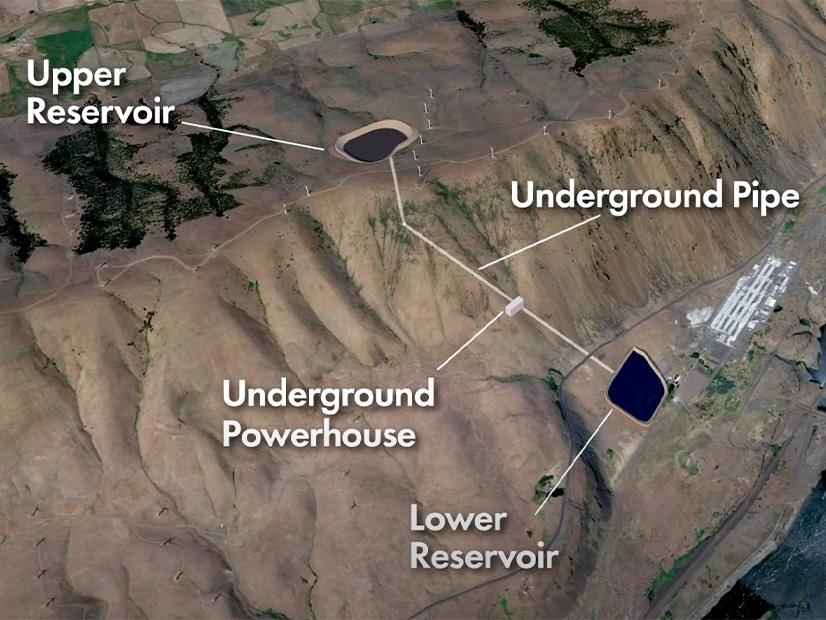
Washington’s Department of Ecology on Monday issued a water quality certificate for a pumped storage project along the Columbia River, sparking protests from area tribes and some environmental organizations because the location contains sites sacred to the Yakama Nation.
Ecology issued the certification with conditions to ensure the construction and operation of the proposed Goldendale Energy Storage Project meet state water quality requirements.
“Conditions include following specific best practices, requirements for getting future Ecology permits and monitoring and notification requirements,” the agency said in a statement.
Opponents have 30 days to appeal the Ecology Department’s decision.
Boston-based Rye Development is hoping to build Washington’s first pumped storage project for $2 billion in southern Klickitat County near the John Day Dam and commence operation between 2028 and 2030. The project is designed to generate 1,200 MW of energy. (See Wash. Pumped Hydro Project Faces Permitting, Obstacles.)
The project would include two lined 600-acre water reservoirs that are 60 feet deep and separated by 2,100 feet in elevation. One reservoir would be on the river shore, the other atop a cliff adjacent to the Tuolumne Wind Project. An underground pipe would connect the reservoirs, with a subterranean electricity generating station along the channel. Water would flow from the upper reservoir to the lower one to power the four-turbine generator station and would then be pumped back up to the upper reservoir in a closed-loop system.
The water quality certification is one of many approvals needed before the project can be built.
FERC and the U.S. Army Corps of Engineers are reviewing a hydropower license and a permit to fill federally regulated waters, respectively. Under the Clean Water Act, the federal agencies require a water quality certification from the Ecology Department before making their decisions.
FERC also released a draft federal environmental review April 6 and is accepting public comments through June 6.
The pumped storage project would be on private land that Rye Development leases from NSC Smelter, which owns the former site of the Columbia Gorge Aluminum smelter site one mile upstream from the John Day Dam. The site is within a large strip of land in southern Klickitat County that the county has zoned for renewable energy projects.
Tribal and environmental opponents issued a press release protesting against the state certification.
While the project is not on Yakama reservation land, it is on property used for sacred ceremonies, and it has a historical connection to the tribe. The project area includes a longhouse, an ancient village site and other sacred sites. Since 1855, the tribe has had treaty rights to fish and hunt in the area, as well as the right to protect burial grounds and religious sites across a vast area in south central and southeastern Washington.
The Yakama, the Nez Perce Tribe, the Confederated Tribes of Warm Springs and the Confederated Tribes of the Umatilla Indian Reservation oppose the project. This year, the Affiliated Tribes of Northwest Indians, representing 57 tribal governments, and the National Congress of American Indians joined the opposition.
“A clean energy future must uphold federal trust and treaty obligations that consider the cultural and health impacts of these projects on sacred sites,” Alyssa Macy of the Warm Springs nation, who is also CEO of Washington Conservation Action, said in a press release from several tribes and environmental organizations. “These parts of our identity — the land, the roots and the water — are a part of our collective history, and we must not erase them.”
“Pumped storage is a critical tool in facilitating our transition to clean energy. However, the current siting of this project reinforces the exploitation of our tribal neighbors and should have been rejected,” said Sept Gernez, acting director of the Washington State chapter of the Sierra Club.


